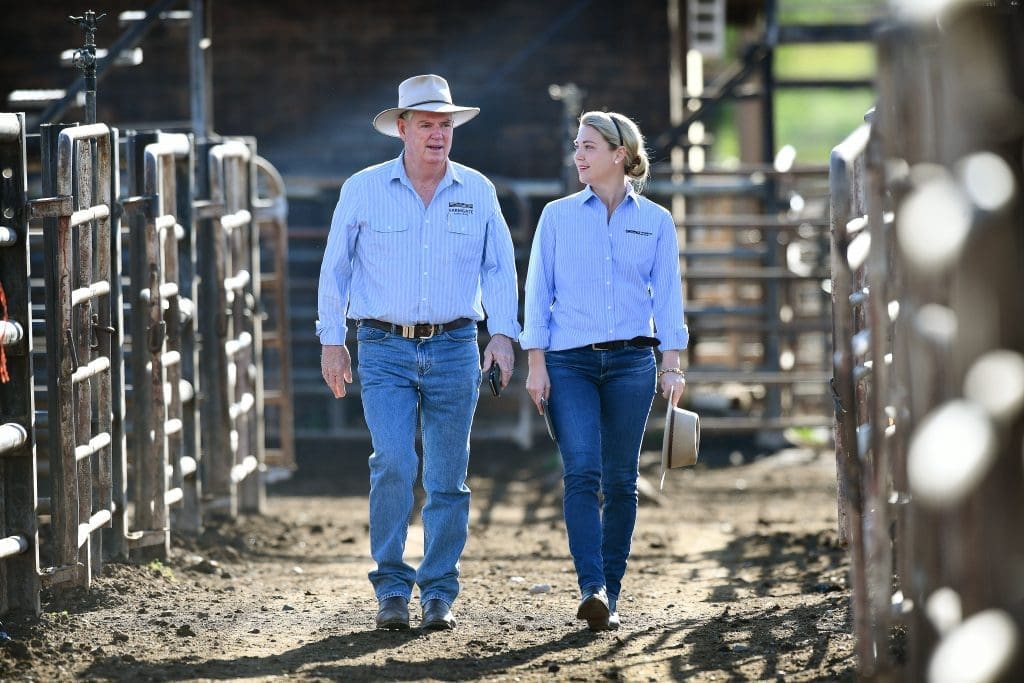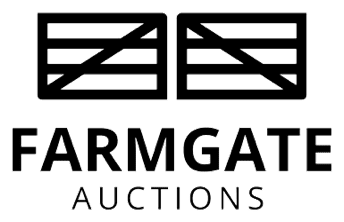
FarmGate founder and director Guy Gallen and general manager Chanel Gallen
A RE-LAUNCHED and radically revised Farmgate online livestock marketing platform has surfaced this week, promising to challenge the well-entrenched, dominant entity in the space, AuctionsPlus.
Former Meat & Livestock Australia managing director and senior agency executive Richard Norton took up the reins as Farmgate board chairman last week, and the business has made some substantial changes to its model designed to better service the industry’s needs.
Once up and running, the new-look FarmGate platform will conduct regular livestock auctions, as well as providing a bid-and-offer facility for cattle and sheep sales.
“This isn’t going to happen overnight. We’re under no illusions as to how hard this is going to be, but we’re here for the long haul,” Mr Norton told Beef Central.

FarmGate launched in 2019 just before COVID, but in its original form, struggled to established any real market momentum.
Rumours sweeping the industry this week that Macquarie Bank had taken a financial interest in the FarmGate business are incorrect, and neither has agribusiness investor AAM, the developer of the Stocklive marketing platform, which has established its own niche in the stud stock sales interface space.
However FarmGate chairman Richard Norton, currently the chief executive of the Food Agility CRC, said the business was in the market seeking equity, and while discussions were progressing well with some ‘good potential partners’, serious inquiries were still welcome.
He said the equity raising was primarily about marketing the merits and new features of FarmGate to the wider livestock sector and agency employee assessors, and to build a team to further develop and manage the platform.
As a digital and data-focussed CRC, Food Agility CRC’s work with FarmGate has been around building the data sets, and helping the company get its new secure payment system (details below) up and running.
Self-assessment
As part of the platform’s revisions, vendors who are appropriately accredited will have the option to self-assess their sale animals. A video tutorial on this vendor assessment accreditation process is available on the FarmGate website.
One of the attractions seen in implementing vendor assessment is the considerable ‘lag’ that can occur between a decision to market some stock, and the time when an accredited stock agent can turn up, perform the assessment, list the cattle and sell them. In the fast-deteriorating cattle and sheep market seen this year, two-to-three weeks can be a very long time in cattle value terms.
A buyer assessment rating system will continue to apply to all cattle assessments, not unlike rating an Uber driver.
One of the conditions for self-assessment is that the cattle must be vendor-bred. Buyers will receive a buyers’ rebate.
Agents will still be able to use the platform as normal, charging their clients an agreed commission for the assessment and listing. Listing fees are available on this page.
Secured-payment system
Another key feature of the new platform is a secured payment system.
FarmGate has partnered with digital financial platform provider FAME Capital to integrate its payment solution with FarmGate’s platform, to mitigate credit risks associated with producers selling livestock and with the auction platform.
FAME Capital will onboard and verify auction buyers, sellers and agents, allowing them to deposit Australian dollars into the FarmGate account. Funds will be held in a settlement account in trust for FarmGate users.
Mr Norton said the digital platform could fast track the licensing and financial side of the auction and replace the manual processing of paperwork including invoicing.
“This will facilitate the near instant settlement of funds upon completion of a livestock auction and has the potential for automated remittance back to the bank accounts of the sellers, and cascading payments such as levies and fees being automatically settled at the moment of auction completion,” he said.
FarmGate general manager Chanel Gallen said the use of a secure, transparent and compliant platform in an auction would allow buyers and sellers to have confidence in the auction process.
“The settlement system protects funds until both buyer and seller agree the livestock are delivered within specification and payments are sent,” she said.
“The reduction in costs, errors and settlement risks will have positive effects.”
“Our settlement process, online training material, accredited assessors training and secure payment options have all been designed to give confidence to buyers and a framework for all parties to work within, and benefit from,” she said.
Reserve Bank CBDC Pilot Program
FarmGate and its financial platform provider FAME Capital have been selected to be part of a Reserve Bank of Australia pilot program to evaluate the benefits of a central bank-issued digital currency (CBDC) used in settling livestock auctions.
The pilot project involves the Reserve Bank collaborating with the Digital Finance Cooperative Research Centre to explore live demonstrations of use cases for a CBDC in Australia. The pilot CBDC will be used to settle a small number of livestock auctions within the FarmGate platform, before the pilot project concludes this month.
‘De-commoditising’ the marketing of livestock
Another key feature of the new platform will be the use of objective data, rather than subjective data, in offerings.
“Farmers currently are price takers, but this technology will allow them to be price makers by allowing producers to control the marketing of their livestock,” Richard Norton said.
Commercial cattle producers will be able to market and sell stock with verified data backed by genomic testing, and information on sustainability credentials, taking them to next-level marketing and product branding.
With the rise of data and subjective measures like DNA testing for commercial traits like marbling, FarmGate says it has taken the subjective assessment of livestock and replaced it ‘real data.’
“Buyers know what they are getting as each lot can have a DNA test sample to predict genetic merit in both heifers and steers, providing objective data to the buyers,” Mr Norton said.
“I recently saw a line of Angus heifers described in an online listing as ‘an attractive line of heifers’. Surely, we can do better than describing decades of breeding as ‘attractive’,” he said.
FarmGate will in future provide buyers with performance traits for both steers and females, based on DNA samples, for those vendors who wish to use it.
“Producers are continually improving their herds and flocks by using EBVs and DNA. Why not use the same data to market your product?” Mr Norton said.
Under the process, a vendor might DNA-test 10pc of their herd or sale lot to obtain a profile, at a cost of around $25 per head. The data would provide a buyer with a complete profile of the sale cattle, for example, that they are 100pc Angus, and are in the top 10pc of the breed for growth and marbling.
“Most Angus producers sell to feedlots and never see the kill sheets to know how their cattle performed. With FarmGate, buyers will know how a vendor’s steers perform on feed and bid with confidence,” he said.
Sustainability credentials
The new platform will also allow vendors to add their biodiversity credentials, emission reduction programs, previous product performance, product branding and transaction data, and then decide how much of this information is passed onto the buyers.
Mr Norton said the easy-to-use platform will deliver benefits to the farmer and service businesses without requiring investment or expertise on their part.
“Farmers can take control of their own marketing with livestock becoming a branded product with genomic, sustainability, carbon and biodiversity credentials,” he said.
Rails run
Many in the industry feel that in the absence of any strong alternatives, Australia’s dominant online livestock marketing platform Auctions Plus got a rails-run during the 2019-20 drought and COVID period, when physical sales were greatly hampered and livestock were moving unusually large distances both north-south and east-west, as restocking occurred in a staged fashion.
This year, however, AuctionsPlus listings and clearance rates have clearly struggled.
Based on industry feedback, primary concerns around AuctionsPlus include price (for example passed-in cattle still attract a fee of $10 a head); and the long delays (described above) that can apply in third-party assessment and listing.
